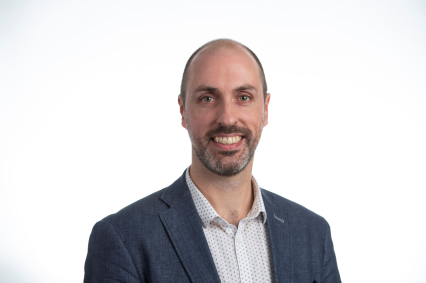Mathieu Giguère
Master in Energy and Materials sciences, 2010
Planning Analyst, Canadian Spatial Agency
“The ALLS laboratory is a jewel that's too well hidden; research fields abound at INRS and the quality of the work carried out would benefit from being better known.”
After graduating from Université Laval with a degree in engineering physics, specializing in photonic optics, Mathieu Giguère wanted to further his knowledge by pursuing a master's degree in partnership with a company. After a few procedures, the Institut national de la recherche scientifique (INRS), in collaboration with Axis Photonique, accepted his application and offered him what he describes as "an exceptional opportunity".
The decision proved to be a wise one for Mathieu, enabling him to be the first graduate student under the supervision of Professor François Légaré, an honour he particularly appreciates, and which has fostered a special relationship with his research director. Mathieu praises his professor's dedication and generosity of time, which enabled him to devote himself fully to his research project.
Mathieu also enriched his career by working as a research assistant at the femtosecond source laboratory, also known as the Advanced Laser Light Source (ALLS), for almost two years. This laboratory, the only one of its kind in the world, represents an internationally renowned research infrastructure focused on the development of a new type of laser with revolutionary applications. Mathieu remains impressed by the performance of the research infrastructure at INRS. “The ALLS laboratory is a world-class infrastructure. At the time of my studies, there weren't many places in the world offering a laser system of this caliber and stature. It was too well kept a secret, in my opinion. The quality of the research carried out there is exceptional.”
“For a young person in his twenties, having the opportunity to work with highly sophisticated equipment and enjoy a high degree of autonomy is a real privilege,” he says. This freedom, combined with access to state-of-the-art equipment and collaboration within a small team, has greatly enriched his experience. He also emphasizes the exemplary availability of the EMT centre's professors and laboratory technicians, who are always ready to help students. Mathieu feels that each one of them contributed to making his time at INRS an extremely positive experience.
Mathieu shares this anecdote of having made a few mistakes that sometimes made him feel uncomfortable, fearing that he had compromised the laboratory's infrastructure. “I've made mistakes from time to time, and my superiors have pointed out that only inaction guarantees the absence of errors and breakages. Sometimes it's necessary to take the initiative and push your limits, so it's natural for mistakes to happen. That's how we learn. These lessons stay with me and continue to guide my actions.”
For the past three years, Mathieu has held the position of Planning Analyst at the Canadian Space Agency. As part of a team dedicated to planning space exploration missions, he works on identifying potential partnerships and future international collaborations for Canada in the field of space exploration. His role also encompasses the coordination of preparatory activities aimed at advancing space technologies, as well as the development of technological projects and other initiatives, notably in the field of lunar exploration.
Numerous investments are directed towards this goal, particularly in the field of space robotics, where Canada has a sought-after expertise. The goal is to contribute to an eventual installation on the lunar surface, and to position Canada for this international project. It is essential to develop national capabilities in anticipation of future needs, and to take advantage of the knowledge acquired to make a significant contribution. Although these projects will take considerable time to bring to fruition, their strategic importance is well worth the effort. “It should be recalled that Canada played a crucial role in the development of the James Webb Space Telescope and continues to position itself as a leader in advanced space technologies,” he adds.
Mathieu feels that his time at INRS prepared him well for this type of planning work. The infrastructures he worked with taught him how to navigate the world of large-scale projects. “In my current position, it's necessary to adopt the same mindset as during my graduate studies, planning long-term projects that always required pushing back one's limits. At the EMT center, most students came from abroad. This experience also prepared me for my current role, as it taught me to adapt and interact with a diversity of international cultures.”
In conclusion, Mathieu has this to say: “We tend to forget that when we're studying, it's really the ideal time to explore as much as possible. Of course, we're committed to our study projects, but we shouldn't hesitate to explore related fields, to discover other disciplines where the expertise we're developing could prove useful. It's a good time to explore. Personally, I'd like to have taken more of these opportunities, and this is a tip that's close to my heart: keep an open mind and be receptive to other perspectives. It's the perfect time to try them out.” And his wish for INRS? “The ALLS laboratory is a jewel that's too well hidden; research fields abound at INRS, and the quality of the work carried out would benefit from being better known.”
[Interviewed in June 2024.]

